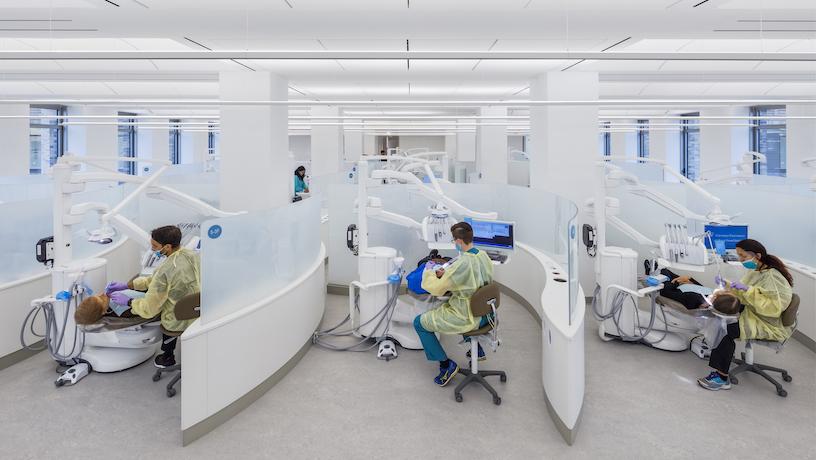First of its kind PhD program combines engineering and dental medicine
Columbia’s new dual degree in dentistry and engineering will train next generation of dental scientists.

Credit: College of Dental Medicine, Columbia University
Despite significant advances made in biomedical research over the past decades, the field of dentistry has suffered from a shortage of dental scientists who can readily translate these advances to improve patient care.
To meet this growing demand and train up the next generation of leaders in dental science, Columbia University has launched a new dual degree program at the intersection of engineering and dentistry. The Doctor of Dental Surgery/Doctor of Philosophy in Biomedical Engineering (DDS/PhD) dual degree program is the first of its kind and will be offered by Columbia Engineering and the College of Dental Medicine at Columbia University.
With the support of the faculty from the Department of Biomedical Engineering, Helen Lu, Percy K. and Vida L.W. Hudson Professor of Biomedical Engineering and Professor of Dental and Craniofacial engineering, helped to develop the program with leadership from the Columbia University College of Dental Medicine, including Dean Christian S. Stohler and Sunil Wadhwa, Leuman M. Waugh DDS Associate Professor of Orthodontics.
We need more dental scientists who can adapt and translate basic science findings into dental health care applications.
Wadhwa sees the offering as a logical step toward addressing current challenges in dental care. “The negative impact of oral health diseases has not improved in the past 30 years,” said Wadhwa. “We need more dental scientists who can adapt and translate basic science findings into dental health care applications.”
Combining engineering and dentistry has already led to significant innovations. Digital dentistry such as intra-oral scanning, CAD-CAM, and 3D printing, has almost replaced dental impressions sent to dental laboratories for the construction of dental appliances and restorations, and AI and Big Data have begun to show promise in the diagnosis and prognosis of oral diseases.
Lu, who is also senior vice dean for faculty affairs and advancement at Columbia Engineering, believes the program will help practitioners make the most of the synergies between dentistry and engineering and enable novel approaches for treating and understanding oral diseases. The program was conceived to advance the current training of dental students with world-class training in biomedical engineering research at the graduate-level.
“With a program such as this, we are meeting a real need for education and research that can lead to breakthroughs in the practice of dentistry,” said Lu. “An education program that combines the latest technologies and scientific findings will equip the next generation of practitioners to be true pioneers in dental medicine.”
Open to a select group of Columbia dental students, candidates for the program will have an undergraduate degree in engineering and the necessary prerequisites to enter the DDS program. Similar to the long-standing and highly successful MD/PhD program at Columbia, these dual degree trainees will earn both a DDS and PhD, entering the Biomedical Engineering PhD program as a doctoral student.
“This partnership signals the next exciting phase of collaboration between engineering, the dental school, and the medical field,” said Columbia Engineering Dean Shih-Fu Chang. “We look forward to seeing new talent and transformative breakthroughs made possible by this unique program."
Each DDS-PhD student will participate in a clinical tutorial program during the entire research portion of their PhD program as persistent clinical exposure has proven to be effective in keeping students well prepared for clinical competence, especially in dentistry. Students also have exposure to clinical specialties and mentors and dental scientist role models to guide their future career choices.
“We have a long history of dental research and a culture of collaboration with other schools at Columbia," said College of Dental Medicine Dean Stohler. "Our dental students are excited about the infusion of new talent and opportunities into our learning environment."
